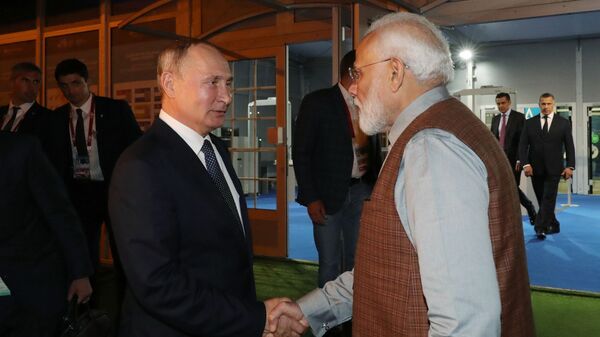Indian delegates attending the first-ever Track 2 trilateral dialogue with their counterparts from Russia and Japan have labelled Russia’s Far East region as “important” for its Indo-Pacific outlook, T.C.A. Raghavan, director general of the government think tank the Indian Council of World Affairs (ICWA), has told Sputnik.
“It is an important region for our Indo-Pacific strategy of open and inclusive Indian and Pacific Oceans, which is centred on connectivity and trade”, says Raghavan, who formerly served as India’s high commissioner to Pakistan.
The trilateral dialogue was hosted by the ICWA in a video format and featured delegates from Japan’s Economic Research Institute for Northeast Asia (ERINA) and the Far East Investment and Export Agency of Russia (FEIEA), a Russian government agency which aims to attract investment to the region, described as “Russia’s Gateway to Asia” by President Vladimir Putin.
Raghavan recalls that “extensive discussions” were held on how to “operationalise” the Chennai-Vladivostok Maritime Corridor (VCMC), a 5,600-nautical mile-long route that would greatly reduce the sea distance between the two cities by allowing traffic to bypass the Suez Canal and Europe. The route passes through the Sea of Japan before ending at Vladivostok, the largest Russian city in the eastern region.
“Prospects of trilateral cooperation in energy, agriculture, forest conservation, agriculture and healthcare in the Far Eastern region were discussed during our discussions. The participants agreed considerably on the view that there could be a great deal of cooperation in the region”, states Raghavan.
The Indian think tank head says that all the sides have agreed to hold "further consultations" in the coming days to move forward on the matter.
In recent years, India has expressed interest in investing in diverse areas in the Russian Far East, including in energy, minerals, healthcare, and agriculture, among others. A delegation of four Indian state chiefs also visited the Russian region in August last year to bolster economic cooperation in a range of areas, including energy, agriculture, rare earth metals, healthcare, and timber products.
In September 2019, Indian Prime Minister Narendra Modi attended the Eastern Economic Forum (EEF) in Vladivostok for the first time since the annual event began in 2015.
A joint statement by Russian President Vladimir Putin and Indian Prime Narendra Minister Modi after the EEF event “expressed satisfaction with the cooperation” between the two countries in the development of the Far East region. India announced its first-ever line of credit for any specific region of the country while unveiling its "Act Far East Policy" during the Vladivostok summit. Experts and officials of the two countries are almost at the final stage to fix the terms and conditions for investment in the region.
A memorandum of intent was also signed between the two countries to start the 5,600 Chennai-Vladivostok shipping route during Modi’s 2019 trip to Moscow.
India’s foreign secretary at the time said the new route would lend “impetus” to the cooperation between India and the Far East region.
The Far East region of Russia lies on the eastern edge of the world’s largest country, seven time zones away from Moscow. China accounts for nearly 70 percent of the foreign investment that the Russian Far East has attracted over the past four years.
The energy and natural resource-rich region shares land borders with China, Mongolia, and North Korea to the south, as well as maritime borders with Japan and the US.
India’s Strategic Interest in Russian Far East
Analysts believe that making Vladivostok a major shipping port in Delhi's Indo-Pacific Vision would lead to a greater Indian maritime presence in the South China Sea, which accounts for a third of the world’s maritime trade. Several reports have reckoned that this would help New Delhi balance China’s growing strategic weight in the region.
Veteran Indian strategic affairs expert Brahma Chellaney tells Sputnik that closer strategic cooperation between India, Japan, and Russia in the Indo-Pacific region is crucial for maintaining a "stable balance of power" in Asia.
"Closer strategic collaboration between Russia, India and Japan can help thwart China’s ambition to shape a Sino-centric Asia", says Chellaney.
Japan, which lies across the Sea of Japan from Vladivostok, has also been looking for enhanced cooperation in the Far East region in a number of areas, mainly in oil and gas.




